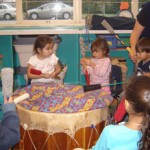 Learning Unit 6 introduces effective communication styles and strategies that aim to facilitate clear and meaningful communication in community and family settings. Specifically, this unit provides an overview of four models that can support initiatives for building positive communication and community relationships in sites such as Aboriginal Head Start. Exploring communication models that draw on Aboriginal traditions and values will contribute to positive and culturally relevant interactions among co-workers, children, families, and others who participate in our Aboriginal Head Start programming.
Learning Unit 6 introduces effective communication styles and strategies that aim to facilitate clear and meaningful communication in community and family settings. Specifically, this unit provides an overview of four models that can support initiatives for building positive communication and community relationships in sites such as Aboriginal Head Start. Exploring communication models that draw on Aboriginal traditions and values will contribute to positive and culturally relevant interactions among co-workers, children, families, and others who participate in our Aboriginal Head Start programming.
Key Learning Ideas
- There are communicative practices that embrace Aboriginal culture and include physical, spiritual, cognitive, and emotional dimensions.
- Effective communication involves attentive listening skills and techniques that focus on interrelationships among the children, families, and community.
- Developing shared beliefs about effective and culturally sensitive communication enhance all relationships and meaningful interactions in Aboriginal communities, including Head Start sites.
- Aboriginal philosophies of effective communication are based on cultural beliefs, values, customs, and traditional teachings.
Objectives of the Learning Unit
- Understand the principles and rationale of culturally relevant communication skills and strategies for Aboriginal Head Start sites.
- Gain knowledge and understanding of four communication processes and/or programs that are relevant to Aboriginal early learning settings.
- Apply culturally relevant communication strategies within Aboriginal Head Start.
- Recognize the role of Aboriginal values and teachings in effective communication, e.g. listening techniques and holistic learning.
Learning Outcomes
At the completion of this learning unit you should:
- Recognize how effective communication plays an important role in building and developing strong relationships—work, family, community.
- Integrate and apply multiple strategies and skills presented within Aboriginal early learning settings.
- Share awareness of, and celebrate traditional communication practices that enhance relationships in Head Start sites with children, families and communities.